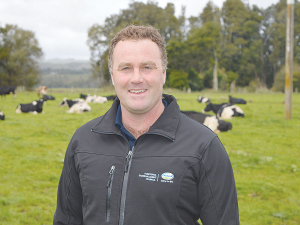Two new awards open to help young farmers progress to farm ownership
Entries have opened for two awards in the New Zealand Dairy Industry Awards (NZDIA) programme, aimed at helping young farmers progress to farm ownership.
 Fonterra Co-operative Council chair John Stevenson says it’s available to pass on farmer concerns and questions to the board.
Fonterra Co-operative Council chair John Stevenson says it’s available to pass on farmer concerns and questions to the board.
Fonterra chair Peter McBride says the co-operative isn't thinking about offering farmers any financial incentives for lowering their on-farm emissions profile.
He points out that Fonterra's Scope 3 emissions target, announced this month, is a co-op wide target that will be achieved by building understanding and helping farmers.
"We are not thinking about incentives. The two bottom lines for me are that the measurement on farm need to be more accurate and any incentive needs to be commercially justifiable," he told Rural News.
The co-operative is targeting a 30% intensity reduction in on-farm emissions by 2030, from a 2018 baseline, which will see it further reduce the emissions profile of its products. 86% of Fonterra's emissions come from on-farm, and the new Fonterra-wide target is seeking to reduce emissions intensity by tonne of FPCM (fat and protein corrected milk) collected by the co-op.
The co-op says the Scope 3 target has been triggered by growing sustainability ambitions from customers and financial institutions, along with increasing market access, legal and reporting obligations for dairy.
Fonterra farmers say the target is achievable, but they expect support from their co-op to achieve it.
McBride says the co-op and DairyNZ will help farmers learn from each other through events like discussion groups.
He points out that the emissions profile among different farming systems and within farming systems are quite alarming.
"If you see in the Waikato, farms that produce over 1200 kgMS, their emissions profile per kgMS is 8-18kg carbon equivalent. That's massive.
"So, what can farmers learn from each other?"
McBride says people need to remember that this is a target.
"We've seen progress made without any focus on it. So, when we focus on it and it's in front of your mind, there are things that you can achieve."
Fonterra Co-operative Council chair John Stevenson told Rural News that the target is broadly in line with what customers and other processors have announced.
"Farmers have always been able to adapt to change. I am confident that this target is achievable."
He also points out that Fonterra farmers will also want to understand the value proposition of making these changes.
"Council believes that Fonterra will need to do more work in this area."
Stevenson says he's encouraged that this is an intensity target which encourages farmers to be more efficient and productive.
"This is something we wake up every day to do. Farmers will be looking closely for the arrival of new on farm and novel technologies that will assist them further with their focus on efficiency. Fonterra have invested farmer capital in novel technologies.
"We will be looking for this investment to deliver."
He says the council is available to pass Fonterra farmers questions and concerns through to the board.
One of New Zealand’s longest-running pasture growth monitoring projects will continue, even as its long-time champion steps away after more than five decades of involvement.
The Insurance & Financial Services Ombudsmen Scheme (IFSO Scheme) is advising consumers to prepare for delays as insurers respond to a high volume of claims following this week's severe weather.
Additional reductions to costs for forest owners in the Emissions Trading Scheme Registry (ETS) have been announced by the Government.
Animal welfare is of paramount importance to New Zealand's dairy industry, with consumers increasingly interested in how food is produced, not just the quality of the final product.
Agriculture and Forestry Minister Todd McClay is encouraging farmers and growers to stay up to date with weather warnings and seek support should they need it.
The closure of SH2 Waioweka Gorge could result in significant delays and additional costs for freight customers around the Upper North Island, says Transporting New Zealand.

OPINION: If the hand-wringing, cravat and bow-tie wearing commentariat of a left-leaning persuasion had any influence on global markets, we'd…
OPINION: With Winston Peters playing politics with the PM's Indian FTA, all eyes will be on Labour who have the…